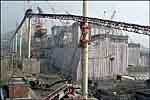Activity 2: Skills and Best Practices
Gathering Information for Problem Solving
Gathering information for problem solving is part of the research cycle. When providing sources of information for students it is necessary to keep in mind that students need to gather information using questions to guide their search, and carefully planning how they will gather the information they need to solve the problem, make the decision, or analyze the issue.Working with the Oak Harbor library media specialists, we examined several models such as the standards and rubrics emanating out of MCREL, and then we decided to draft our own rubrics to match a seven-step research cycle (McKenzie, 1995) that we expected students to employ. We agreed that the rubrics should be user-friendly in order to invite the broadest possible coalition of teachers and librarians to employ the research cycle.
The RESEARCH CYCLE (McKenzie, 1995)
- questioning
- gathering
- sorting & sifting
- synthesizing
- evaluating
Comparing and Contrasting
Higher order thinking skills must be taught. This site suggest that if we carefully teach thinking skills, such as comparison, change, and causation, there is carry over into other aspects of the discipline.The three C's: Comparison, Change, and Causation
At present, considerable attention is focused on a type of thinking strategy that may be termed "discipline-based analysis." This species of analysis will be considered shortly, but first, we'll review three somewhat more traditional approaches to thinking strategies in school:
- comparing and contrasting cultures
- continuity and change over time
- cause-and-effect relationships
Bain said that comparative history serves several purposes. It can help students locate the significance in an event, help identify the common in the event that may be generalized to other situations, assist in uncovering the less obvious or hidden aspects of a situation that deserve attention, and, according to Bain, comparison does, indeed, stimulate higher-order thinking skills.

 Module Menu
Module Menu Printable View
Printable View